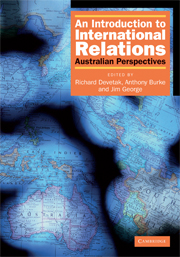Book contents
- Frontmatter
- Contents
- List of tables, figures and boxes
- List of contributors
- Preface and acknowledgments
- An introduction to international relations: the origins and changing agendas of a discipline
- 1 Theory and practice in Australian international relations: the search for identity and security
- Part 1 Theories of international relations
- Part 2 The traditional agenda: states, war and law
- 10 The modern state and its origins
- 11 Nationalism and war
- 12 Security
- 13 Arms control
- 14 The changing character of warfare
- 15 The ethics and laws of war
- 16 International law
- 17 International society and european expansion
- 18 Order and decolonisation in Southeast Asia
- 19 The cold war
- Part 3 The new agenda: globalisation and global governance
- Glossary of terms
- Bibliography
- Index
- References
10 - The modern state and its origins
from Part 2 - The traditional agenda: states, war and law
- Frontmatter
- Contents
- List of tables, figures and boxes
- List of contributors
- Preface and acknowledgments
- An introduction to international relations: the origins and changing agendas of a discipline
- 1 Theory and practice in Australian international relations: the search for identity and security
- Part 1 Theories of international relations
- Part 2 The traditional agenda: states, war and law
- 10 The modern state and its origins
- 11 Nationalism and war
- 12 Security
- 13 Arms control
- 14 The changing character of warfare
- 15 The ethics and laws of war
- 16 International law
- 17 International society and european expansion
- 18 Order and decolonisation in Southeast Asia
- 19 The cold war
- Part 3 The new agenda: globalisation and global governance
- Glossary of terms
- Bibliography
- Index
- References
Summary
Introduction
This chapter introduces the principal actor in international relations: the sovereign state. It begins by defining the state. Second, it explores the origins of the state in the transition from the medieval to the modern world. Third, it examines the concept of sovereignty, especially as it was enunciated in early modern political thought. Fourth, it surveys different historical explanations of how the sovereign state triumphed over alternative forms of political society. Finally, it surveys some of the continuing debates about the morality and utility of the modern state.
What is a state?
The state may not be the only actor in world politics (see chapter 23), but it is widely recognised as the one that has the greatest impact on people's lives. It is, as John Dunn (2000: 66) says, ‘the principal institutional site of political experience’. This is why the title of Australian scholar J. D. B. Miller's book, A world of states, seems like such an apt description of international relations. But although we live in a world of states today it was not always thus. At various moments in time, city-states, empires, feudal states, absolutist states or nation-states have been the dominant institutional form. So although humanity has always been divided into separate political societies, the character of these societies has varied historically and geographically.
Information
- Type
- Chapter
- Information
- An Introduction to International RelationsAustralian Perspectives, pp. 121 - 132Publisher: Cambridge University PressPrint publication year: 2007
